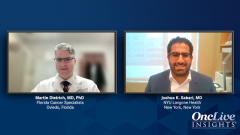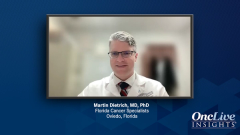
Addressing Inadequate Molecular Testing in Patients With NSCLC
Expert perspectives on course-correcting the management of patients with NSCLC who may not have received adequate molecular profiling in the past.
Episodes in this series

Transcript:
Joshua K. Sabari, MD: Martin, I want to run a scenario by you. Say, you inherit a patient, and we often inherit patients, maybe they received the first line somewhere else or at another institution. And they did not have adequate testing, let's say, maybe they had an IHC done for EGFR and ALK, and maybe PDL1 expression. And they're already on standard of care carboplatin, pemetrexed and pembrolizumab. What are you doing for them in that setting?
Martin Dietrich, MD, PhD: It's a frequent scenario and it's difficult because we don't have any randomized data to suggest switching scenario if a patient is on a sub optimal therapy. I always try to be pragmatic and basically try to catch up as soon as I can to get patients on treatment up to date on their molecular testing. At the first visit, whether it's a second opinion or transfer of care, I try to obtain these tests on tissue and liquid. And depending on how the patient is doing, how the patient is tolerating the medication, I would adjust. If it is an EGFR mutation as you mentioned, I'd be very cautious with a continuation of immunotherapies, I would probably feel it would be a good time to start a washout. It is hard to explain to a patient why switching therapy would be made. And obviously, I can't point to a large phase 3 study that would say this is the most optimal way of turning, whether you treat until progression, you treat until the next scan or more arbitrarily switch, there's a lot of confusion in the data and the guidelines. My take on this, if I have a patient with an actionable mutation that has an opportunity for a switch, for sake of adverse effects alone, typically is better tolerated. I treat to the next, I'm going to say, logical turn, which is probably the next scan. And then, would switch over a patient knowing that I may have been on a therapy that still have been successful. But I say that this is a personal assessment that I can't back up with a lot of data. The sequence then becomes very blurry, which is why it's so important to have the upfront genetic testing appropriate. So that we can really base all our treatment decisions on prospective randomized phase 3 data and rather than making our own practice concept a major decision-making factor for patients. The sooner, the better. And it's never too late to correct a biological assessment of a patient which includes patients that maybe out of standard of care options. We've had patients before I go and recommend a palliative care route, I want to have a molecular test in front of me so I can say there are truly no more options that are reasonable. You notice in your practice probably not that different from mine. If I have an ECOG performance status three, that I wouldn't recommend systemic chemotherapy options. I would still feel very comfortable giving an ALK inhibitor or an EGFR inhibitor for that matter. It's important before you make any decisions, but the sooner, the better, is my standard concept. And I try to explain as much as I can.
Joshua K. Sabari, MD: I couldn't agree more. The sooner, the better. And then, also, if you don't have it or you're meeting somebody new and it was not said, there's no bad time to get NGS. And I couldn't agree with you more and patients who I meet who've had 3 or even 4 lines of therapy who've not had adequate NGS testing. You'd be surprised, right? 10%-15% of the time, you can identify an actionable alteration where the patient can do quite well, right? Benefit from the receiving of a targeted therapeutic.
Transcript edited for clarity.





































